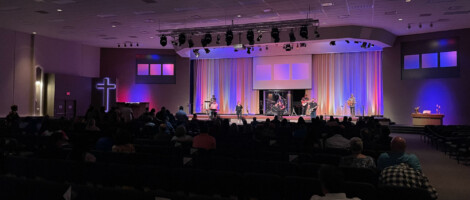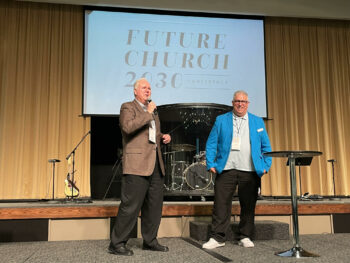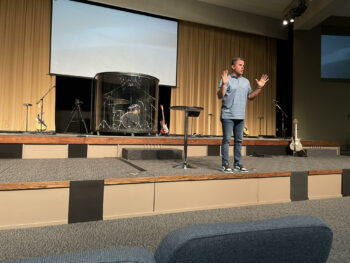Future Church 2030 Conference helps churches build strong ministries and make disciples in the future years
by George Schroeder on May 3, 2023 in Church Health

EL PASO – Given the region’s status as a vital intersection – in Spanish, it’s “The Pass” – Bobby Contreras encouraged attendees at the Future Church 2030 Conference to recognize not just the importance of the cultural moment, but El Paso’s important place in that moment.

Because it is quite literally a crossroads – where cultures meet and mingle, even if they’re just passing through – Contreras said area pastors and ministry leaders must consider their unique position in a rapidly changing context.
“Friends, El Paso is significant to the future of the church,” said Contreras, an El Pasoan who now pastors Alamo Heights Baptist Church in San Antonio. “What God is doing here will go east and west, north and south. It’s significant for the future.”
The conference, held April 28-29 at Del Sol Church, was designed to help ministry leaders see what is coming next, and how they can prepare and position their ministries to share the gospel and make disciples. Nearly 200 people attended – an answered prayer for Larry Floyd, the executive director of the El Paso Baptist Association, which cosponsored the conference.
After the inaugural Future Church 2030 Conference, held in 2022 in Bryan, several El Paso church leaders returned inspired and encouraged and wanted others from West Texas to have the same opportunity.
“It was amazing,” Floyd said. “The speakers presented great ideas, facts and encouragement.”
Preparing the leaders of the future
Friday morning, Ariel Martinez, pastor of the host Del Sol Church, cited statistics that 96% of El Pasoans don’t come from a biblically-based church background. He encouraged ministry leaders to embrace change without compromising biblical standards.
In “feedback from the future,” he shared a survey he’d done with seven committed Christ followers who are members of Generation Z – those who are currently teenagers through their mid-20s.
“They’re gonna be the ones in leadership roles in the church by 2030,” he said. “They’re the future – and they’re here right now.”
Martinez asked about their peers’ perceptions of God, the Bible and church, and what the church should start and stop doing.
Among the findings: Gen Z wants pastors “to leave politics out of the church,” he said. “We have to lead people to Jesus, not to partisan politics or any political preference.” Several said the church needs to focus on “real-life topics” – one girl suggested, for example, the church should “talk more about repentance – but (explain better) what it means.”
Martinez told of a teenager who saw the biblical reference “John 3:16,” and asked: “What are those numbers after that name?”
“What a great opportunity,” Martinez said, “to share the gospel with someone who’s never heard it before.”
Martinez encouraged ministry leaders to personally invest in younger Christians, and to “focus on what doesn’t change. That provides a stable foundation for the church in the future. And it’s what so many of our young people crave.”
Robert White, lead pastor of Freedom Church in Bedford, took attendees “back to the first Future Church conference,” the account from Matthew 16 when Peter confessed Jesus as the Messiah, and Jesus responded, “On this rock I will build my church, and the gates of hell shall not prevail against it.”
Noting that despite gloomy prognostications of the decline of the church in the West, “Jesus is not surprised by all the things that are happening in this world,” White also pointed to the dramatic increase in the church in other parts of the world, saying: “We have evidence that Jesus is still building his church.”
He said the future church must be willing to have conversations, to make and emphasize connection, to have a commitment to discipleship, and to be ready to “pass the baton” to younger leadership.
Rebuilding a Christian culture
Eric Hernandez, apologetics lead and millennial specialist for Texas Baptists, challenged ministry leaders to equip Christians to “give a defense for what we believe and why we believe it,” using the familiar passage in 1 Peter 3:15. Hernandez said 64% of young people are leaving the church upon reaching adulthood, and that only 4% of Gen Z hold biblical worldviews.
“It’s the first truly post-Christian generation,” Hernandez said. “They were not born into a Christian culture, and it shows.”
Katie McCoy, director of Women’s Ministry for Texas Baptists, spoke of the similarities of the culture in which the early church thrived, and the culture in which the 21st Century church is battling headwinds. Because First Century culture “gave little value to human life,” she said, Christians stood out because of their commitment “to protect and care for society’s most vulnerable.”
Mccoy said it's an important lesson – and opportunity – for the church now to demonstrate an attractive contrast with culture. But she also cautioned that the church’s motives must be righteous.
“We are [Christ’s] ambassadors, and when we are righting earthly wrongs, it shouldn’t be for political power,” she said. “It should be to be the salt of the world.”
Katie Frugé, director of the Center for Cultural Engagement, described the “rise of the unknown” through “pseudonymity,” in which a person can create “a consistent identity without any identifying markers,” allowing them to “create their own narrative.” This phenomenon, she said, is creating “a fundamental trust issue.” She described a culture in which people are “discipled” by social media platforms like YouTube – which boasted 1 billion hours of usage during 2021.
“That’s the equivalent of 114,000 years (of video viewing),” she said. “That’s a lot of discipleship.”
The answer for the church, she said, is to “meet people like Paul did in the Areopagus – or in the metaverse,” and we point them to the Savior. “Christ is the firm foundation in the shifting sand of this world,” she said.
Preparing today for tomorrow
Friday evening, Jordan Easley, pastor of First Baptist Church of Cleveland, Tenn., told attendees he is from an eighth-generation Texan from Odessa, who is now “a foreign missionary in Tennessee.” Easley asked: “What are we doing today for seven years from now?” And he said pastors and ministry leaders must seek to understand God’s specific vision for their individual churches, then think strategically to achieve it.

“Do not allow your church to linger on things that won’t matter in 10 years,” he said.
Saturday morning, Jonathan Smith, director of Church Health Strategy for Texas Baptists, challenged pastors, especially if their church has plateaued or is declining, to evaluate every ministry of the church, asking this question: “Is this ministry making disciples?”
Priority must go to ministries which are making disciples, because “the days of unbelievers showing up at church are over – go and make disciples,” Smith said. “When a church says, ‘We’ve never done it that way before,’ evidently they’re ignoring the entire biblical record, because the Bible is filled with ‘new.’”
He also challenged pastors to the correct mindset: “Your church is not in competition against other churches in your community. It is in competition against the darkness.”
Scott McConnell, executive director of Lifeway Research, showed that in Texas, self-described “nones” – people who do not identify with any religion – grew from 17% to 30% from 2008-2018. He said reaching a post-Christian culture requires patience and persistence.
But McConnell noted that surveys indicate Christians rarely speak of their faith, even as some of those same surveys show most Americans are open to and even curious about matters of faith, and express a “desire to meet deep needs.” He encouraged leaders, from Ephesians 4, to work to equip Christians “for the work of ministry.”
Drawing from the account in Mark 2 when a group of friends were so determined to help their friend they removed the roof of a house, then lowered him to Jesus, Contreras said whether the future of the church is “tomorrow, next week, a year from now, seven years from now, or 10 years,” the critical need is paramount.
“If we don’t get [the lost] in front of Jesus, it’s not even worth talking about,” he said.
He urged pastors and ministry leaders to free themselves from sin’s entanglements by confessing and repenting. He described Psalm 51:13 as his “life verse as a pastor:” “Then I will teach transgressors your ways, and sinners will return to you.”
“It starts there,” he said – with pastors’ personal holiness. He also urged pastors to be persistent in prayer and encouraged them to “be patient.”
“I know you’ve just been poured upon [this weekend] with information, and you’re thinking, ‘What do I do?’” Contreras said. “Be patient. Make an appeal to Jesus. Cry out to him.”
Floyd said the El Paso Baptist Association plans to follow up with area participants in a meeting in August, to begin to build on what was presented and learned – to help answer the question, according to Floyd: “Now what?”
Strengthening a multiplying movement of churches to live out the Great Commandment and Great Commission in Texas and beyond.
The ministry of Texas Baptists is made possible by giving through the Texas Baptists Cooperative Program, Mary Hill Davis Offering® for Texas Missions, Texas Baptists Worldwide and Texas Baptist Missions Foundation. Thank you for your faithful and generous support.
Subscribe to receive stories like this one directly to your inbox.
We are more together.
Read more articles in: Church Health, News
More from George Schroeder
- FBC Buffalo uses Pave strategies to grow attendance and baptisms
- Pastor Sabbatical Grant helps pastors escape burnout
- Messengers adopt amended motion to affirm women in ministry in second business session
- Center for Cultural Engagement Family Dinner encourages Texas Baptists toward unity for the sake of the gospel
- Christina: Let’s not forget our first love